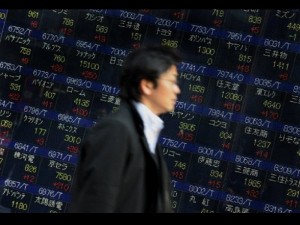
The Nikkei 225 index at the Tokyo Stock Exchange was down 2.83 percent, or 265.07 points, at 9,115.18 points in the first few minutes of trading after losing 1.94 percent at the open.
The yen meanwhile rose to its highest level since mid-February against the euro as markets fretted about the poll results having a knock-on effect on European austerity measures.
“The biggest factor is going to be the stronger yen. Investors were hoping for the triumph of more austerity-friendly governments in both France and Greece,” said Tsutomu Yamada, a market analyst at kabu.com Securities.
The euro bought 103.62 yen in Tokyo morning trade after falling to 103.22 yen earlier Monday, the single currency’s lowest level since mid-February and sharply down from 104.50 yen in New York late Friday.
Against the dollar, the euro briefly fell to its lowest level in more than three months before recovering to $1.2973, still down from $1.3082 on Friday in New York.
In France, Socialist challenger Francois Hollande was set to be confirmed as France’s president-elect, after incumbent Nicolas Sarkozy conceded defeat, according to nearly complete results.
Analysts said Hollande’s victory underscored the politically difficult task of selling austerity measures designed to tackle eurozone nations’ huge debts, with Hollande advocating economic growth over deep public spending cuts.
Greek voters showed their lack of enthusiasm for belt tightening, dousing hopes that Athens will stick to its austerity pledges as parties opposing more cuts won almost 60.0 percent support in a general election Sunday.
The Tokyo market was also weighed down by mostly disappointing US economic data released Friday, including jobs figures and factory orders.
The Dow Jones Industrial Average was off 1.27 percent to 13,038.27 on Friday.
— Dow Jones Newswires contributed to this article —